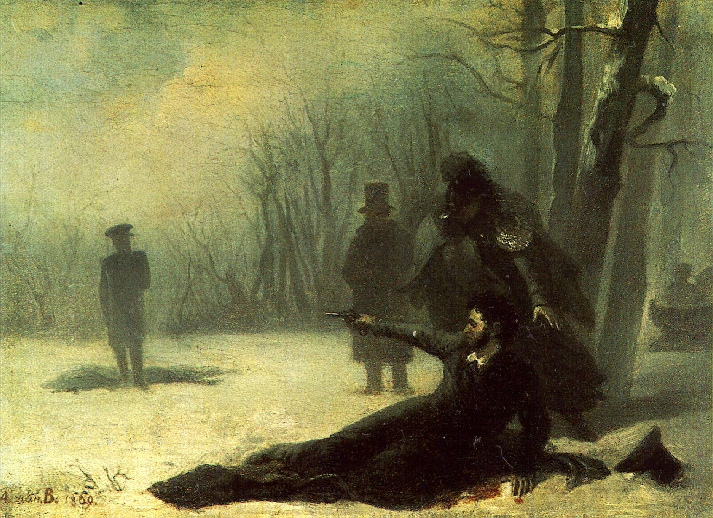
Duel of Pushkin and George d’Anthès (1869), by Adrian Volvo, credit Wikipedia
Love’s Vicissitudes
L’elisir d’amore at Longborough Festival Opera, Tuesday 27th June, 2023, The Queen of Spades at The Grange Festival, Thursday 29th June, 2023, reviewed by David Truslove
Donizetti’s L’elisir d’amore and Tchaikovsky’s The Queen of Spades may have little in common, but both these new productions drew inspiration from their immediate surroundings. A typical Cotswold village was lovingly created for Longborough Festival Opera’s Donizetti, while an orangery, echoing past affluence in leafy Hampshire, provided the setting for The Grange Festival’s Tchaikovsky.
At Longborough, its picture book charm well suited to country house diversion, it was summer season fun with director Max Hoehn declining to take the plot’s love-conquers-all theme seriously. Jemima Robinson’s designs updated Donizetti’s 1832 rom.com to contemporary rural Britain; stone walls, phone booth-turned-defibrillator, post box and park bench framed by a jigsaw puzzle of birdlife with a topical slogan declaring ‘Green, pleasant and now protected’. When the stage was not already crowded, it was then peopled by a postie (Nemorino) and a chorus of villagers; policeman, builders with hard hats, a Goth, two pensioners and a schoolgirl (Giannetta) on a scooter.
Jennifer Witton as Adina did not have the hauteur one would expect from a landowner’s daughter, while South African tenor Thando Mjandana, as a besotted and initially shy Nemorino, strode a little too confidently around the stage. Nonetheless, Witton’s jewel-like soprano managed Donizetti’s vocal athletics with aplomb, and matched the ardour of Mjandana, blossoming as he moved from lapdog to master charmer and gaining our affection in ‘Una Furtiva Lagrima’. He persuaded us that an ordinary man can have the sensibility of a poet.
Arthur Bruce’s Belcore made a striking entrance as a crashed pilot – oddly translated from Donizetti’s dashing Sergeant – but despite his swagger chemistry was in short supply with Nemorino when he obsessed over a model airman during his enlistment duet. It was the evening’s weak link. More convincing was Emyr Wyn Jones’s travelling quack Dr Dulcamara peddling his fake love potion, whose song advertising his love potion was finely sung. Unlike many of Donizetti’s comic operas, L’elisir is free of banal passages. A pity, then, that the role of Giannetta is so small, especially when sung with such assurance by South Korean soprano Haegee Lee. At the helm of the Longborough Festival Orchestra, Alice Farnham brought sparkle to Donizetti’s frothy score, the whole a refreshing elixir, albeit more prosecco than champagne.
From Donizetti’s sunny farce and rural village life to Tchaikovsky’s shadowy fatalism and the aristocratic society of late 18th century St Petersburg is a startling shift. That said, Grange Festival’s new production, directed by Paul Curran, was more grandiose Edwardiana than anything obviously Slavic. Gary McCann’s sets looked handsome enough, though unhappily the curtain came down every time the stage was transformed to become a ballroom, bedroom or gambling den, stopping momentum in its tracks.
The multi national cast included Ukrainian Andrei Kymach (Count Tomsky) whose powerful baritone made it clear why he won Cardiff Singer of the World in 2019. And Russian Ilya Kutuykhin (Prince Yeletsky) captivated the audience when singing to Lisa, a role sung by British-Armenian soprano Anush Hovhannisyan. Her love for Herman (Eduard Martynyuk) was wholly convincing, anxieties and past regrets well depicted with a voice that radiated warmth. By contrast, Martynyuk felt stolid but his expressionless face and somewhat robotic moves were allied to an ardent and emphatic voice that rang out resolutely. The most memorable contribution, however, was from veteran soprano Dame Josephine Barstow as the Countess. Whether reminiscing of her Parisian youth or stilling the audience with her ghostly revelation of the three cards, she gave a master class as singer-actor. Now 82, she commanded the stage with every dignified movement, shifting glance and fiery consonant. Fine singing, too, came from the chorus, both adults and children, the a cappella men’s voices especially moving.
Despite Barstow’s captivating presence, there were times when the work’s dramatic tension was mainly created from the pit where conductor Paul Daniel and the Bournemouth Symphony Orchestra drew out Tchaikovsky’s dark colouring from its ink black opening pages through to its haunting closing bars. Curiously, in 1915, The Queen of Spades was called ‘a romance’ by The Times shortly before the work was given its British premiere at London’s Drury Lane Theatre. In Pushkin’s original novella of 1833, Lisa eventually marries a dull functionary while the anti-hero Herman, diminished by his gambling addiction, is confined to a mental asylum. Tchaikovsky rejects this ending, preferring the drama of a double suicide. If one adds a preoccupation with obsession, hopeless love and the supernatural, then you can’t get much further from the escapism of L’elisir d’amore.
David Truslove is an opera critic
Like this:
Like Loading...











